Home batteries vs. power generators
When the power goes out, it’s a real hassle. Nobody likes being left in the dark, especially when it affects everything from keeping the fridge cold to charging your phone. Luckily, there are a couple of popular ways to keep your home running: home batteries and power generators. Both can save you from a blackout, but they work pretty differently and have their own pros and cons. We’ll break down what each option offers so you can figure out what’s best for your home.
Key Takeaways
- Home batteries store electricity and are quiet, clean, and need little maintenance. They can also work with solar panels.
- Generators run on fuel like natural gas or propane, are louder, and need more upkeep and a constant fuel supply.
- While batteries often cost more upfront, they can save you money over time, especially if you have solar power.
- Generators are usually cheaper to buy initially, but their fuel and maintenance costs add up.
- Both systems help during outages, but batteries offer a more modern, eco-friendly solution with less noise and fuss.
Understanding Home Batteries
How Home Batteries Work
Home batteries are basically rechargeable power banks for your house. They store electrical energy for later use, providing backup power during outages or helping you use electricity more efficiently. Think of them like a giant phone battery, but for your entire home. They can be charged from the electrical grid, or even better, from home solar system.
Benefits of Home Batteries
Home batteries offer a bunch of advantages.
- First, they provide backup power, keeping your lights and appliances running when the grid goes down.
- Second, they can save you money by storing energy when it’s cheap (like overnight) and using it when it’s expensive (during peak hours).
- Third, they can reduce your reliance on the grid, making you more energy independent.
Home batteries are becoming increasingly popular as people look for ways to protect themselves from power outages and reduce their carbon footprint. They offer a clean, quiet, and reliable source of backup power.
Solar Integration with Batteries
Pairing a home battery with solar panels is where things get really interesting. The solar panels generate electricity during the day, which can then be stored in the battery for use at night or during cloudy days. This combination allows you to maximize your use of renewable energy and further reduce your dependence on the grid. Plus, with solar, the renewable resource that is the sun powers batteries. Some popular options include the Tesla Powerwall and the LGES 10H and 16H Prime.
Understanding Home Generators
How Generators Operate
Generators are essentially backup power sources that kick in when the main electricity grid fails. They work by converting mechanical energy into electrical energy. A generator typically consists of an engine, an alternator, a fuel supply, and various control systems. When a power outage occurs, the engine starts, driving the alternator to produce electricity. This electricity is then fed into your home’s electrical panel, providing power to essential appliances and systems. It’s important to understand the generator’s power needs to ensure it can handle the load.
Fuel Sources for Generators
Generators can run on a variety of fuel sources, each with its own advantages and disadvantages:
- Natural gas: Convenient if you have a natural gas line, providing a continuous fuel supply. However, natural gas availability can be affected by widespread outages.
- Propane: Offers a good balance of availability and storage. Propane tanks can be refilled as needed, but require space for storage.
- Diesel: Known for its reliability and energy density. Diesel generators are often used in heavy-duty applications, but diesel fuel can be more expensive and produce more emissions.
Choosing the right fuel source depends on factors like cost, availability, storage capacity, and environmental considerations. Each fuel type has specific requirements for generator setup and maintenance.
Limitations of Generators
While generators are a reliable backup power solution, they do have some limitations:
- Noise: Generators can be quite noisy, especially older models. Noise levels can be a nuisance to you and your neighbors.
- Maintenance: Generators require regular maintenance, including oil changes, filter replacements, and spark plug checks. Neglecting maintenance can lead to performance issues and reduced lifespan.
- Fuel Storage: Storing fuel, especially gasoline or diesel, can be a hassle and a safety concern. Fuel can degrade over time, requiring stabilizers or periodic replacement.
Comparing Batteries and Generators
Key Differences in Backup Power
When it comes to keeping the lights on during a power outage, both home batteries and generators have a role to play, but they go about it in very different ways. The core difference lies in how they store and deliver energy. Batteries store electrical energy for later use, while generators create electrical energy by burning fuel. This fundamental difference impacts everything from installation to maintenance and environmental impact. Think of it like this: batteries are like a rechargeable power bank, and generators are like a mini power plant.
Performance Comparison of Batteries
Home batteries offer a seamless transition during power outages. You likely won’t even notice the power went out! They provide clean, quiet power, and their performance is pretty consistent until they run out of juice. Here’s a quick rundown:
- Response Time: Instantaneous switchover.
- Power Output: Limited by battery capacity and inverter size.
- Runtime: Depends on battery size and energy consumption.
- Scalability: Can be expanded by adding more batteries.
Batteries are great for backing up essential circuits, but they might not be able to handle heavy loads like air conditioners or electric stoves for extended periods.
Generator Performance Metrics
Generators, on the other hand, can supply a lot more power for a longer time, as long as they have fuel. But they come with some trade-offs. They need a few seconds to start up, they’re noisy, and they produce emissions. Here’s what you need to know:
- Response Time: Typically 5-15 seconds to start and stabilize.
- Power Output: High, capable of running multiple appliances simultaneously.
- Runtime: Limited only by fuel supply.
- Fuel Efficiency: Varies depending on the generator size and load.
To help you visualize the differences, here’s a quick comparison table:
| Metric | Home Solar Batteries | Home Generators |
|---|---|---|
| Upfront Cost | $$$ | $$ |
| Running Cost | Low | Moderate to High |
| Noise Level | Quiet | Noisy |
| Maintenance | Low | Moderate |
| Environmental Impact | Low | High |
Choosing between lead-acid and lithium-ion batteries really depends on your specific needs and priorities. If you want clean, quiet, and seamless backup power for essential circuits, a battery is a good choice. If you need to power your whole house for an extended period, a generator might be a better fit.
Cost Considerations for Backup Power
Upfront Costs of Batteries
Okay, so let’s talk money. When you’re looking at home batteries, the initial cost is definitely something that grabs your attention. You’re typically looking at a higher upfront investment compared to generators. A solar-plus-storage system can easily set you back several thousand dollars, depending on the size of the battery and the complexity of the installation. It’s not unusual for a decent battery setup to cost somewhere between $10,000 and $20,000, maybe even more if you want whole-house coverage. This includes the battery itself, any necessary inverters, and the installation labor. It’s a big chunk of change, no doubt about it.
Long-Term Savings with Batteries
But here’s the thing: while the upfront cost is higher, batteries can save you money in the long run. They can be paired with solar panels, allowing you to store excess solar energy and use it later, reducing your reliance on the grid. This is especially useful during peak hours when electricity prices are higher. Plus, many states and utility companies offer incentives and rebates for installing home batteries, which can significantly reduce the initial cost. Over time, these savings can add up, making batteries a more cost-effective option than generators, which constantly need fuel. It’s like paying more now to save later, which is a concept I can get behind.
Generator Fuel and Maintenance Costs
Generators might seem cheaper initially, but don’t forget about the ongoing costs. They need fuel to run – either gasoline, propane, or natural gas – and those fuel costs can really add up, especially during extended power outages. Plus, generators require regular maintenance, including oil changes, filter replacements, and spark plug checks. All these things cost money and time. And let’s not forget the potential for repairs. Generators are mechanical devices, and like any mechanical device, they can break down. So, while the price of purchasing and installing a standby generator might be lower at first, you need to factor in all the extra expenses to get a true picture of the total cost of ownership.
It’s important to consider your individual energy needs and usage patterns when deciding between batteries and generators. If you only need backup power occasionally, a generator might be more cost-effective. But if you want a more sustainable and potentially cheaper long-term solution, batteries are worth considering.
Installation Process and Complexity

Battery Installation Requirements
Installing a home battery is generally less complex than installing a generator, but it’s still not a simple DIY project. Most battery systems need to be installed by a certified electrician to ensure everything is up to code and safe. The process usually involves mounting the battery on a wall or a concrete pad. Some newer, more user-friendly models are designed for easier setup, almost like a large portable power station, but professional help is still often recommended, especially when dealing with electrical connections. You might need a smart electrical panel or a transfer switch installed, depending on how you want the battery to integrate with your home’s electrical system.
Generator Installation Steps
Generator installation is a more involved process. First, you’ll need a level concrete slab for the generator to sit on. Then, you have to connect the generator to a fuel source, whether it’s natural gas or propane. A dedicated fuel line needs to be run, which can be tricky. You’ll also need a transfer switch installed so you can safely switch between grid power and generator power. This prevents backfeeding electricity into the grid, which is dangerous. Getting a generator installed often means permits and inspections, too, adding to the complexity.
Professional Installation for Batteries
While some battery systems might seem easy to set up, it’s almost always best to go with professional installation. Here’s why:
- Safety: Working with electricity is dangerous, and a mistake can be life-threatening.
- Code Compliance: Electricians know local codes and regulations, ensuring your installation is legal and safe.
- Warranty: Many battery manufacturers require professional installation for the warranty to be valid.
- Proper Integration: A pro can make sure your battery system is properly integrated with your home’s electrical system and any solar panels you might have.
Even though batteries are often marketed as easier to install, the electrical work involved means it’s usually not a DIY job. Paying for professional installation is an investment in safety and peace of mind. Plus, it ensures your system will work correctly when you need it most.
Maintenance and Environmental Impact
Low Maintenance for Batteries
Home batteries are pretty hands-off. Once they’re installed, there’s not a whole lot you need to do to keep them running smoothly. Unlike generators, which have engines and moving parts, batteries are solid-state devices. This means fewer things to break down or wear out. You might want to check the connections and overall system health every now and then, but that’s about it. Plus, many modern batteries come with monitoring systems that alert you to any potential issues before they become major problems. This ease of maintenance is a huge plus for anyone who doesn’t want to spend their weekends tinkering with backup power equipment.
Generator Maintenance Needs
Generators, on the other hand, need regular attention. Think of them like a car engine – they need oil changes, filter replacements, and spark plug checks. If you skip these maintenance steps, you’re asking for trouble. Here’s a quick rundown of what’s typically involved:
- Regularly check the oil level and change it according to the manufacturer’s recommendations.
- Inspect and clean or replace air filters to ensure proper airflow.
- Check spark plugs and replace them as needed.
- Run the generator periodically, even when there’s no power outage, to keep the engine lubricated and prevent fuel from going stale.
Neglecting generator maintenance can lead to decreased performance, increased fuel consumption, and even complete failure when you need it most. It’s a commitment that requires time, effort, and sometimes, professional help.
Environmental Benefits of Batteries
When it comes to being green, batteries have a clear advantage. They don’t burn any fuel, so they don’t produce any emissions. This is especially important if you’re concerned about air quality or your carbon footprint. Plus, if you pair your battery with solar panels, you can create a truly sustainable energy system. The environmental impact is significantly lower compared to generators. Here’s a quick comparison:
| Feature | Battery | Generator |
|---|---|---|
| Emissions | Zero | High |
| Fuel Consumption | None | Significant |
| Noise | Very Quiet | Loud |
| Carbon Footprint | Low (especially with solar) | High |
Batteries are a cleaner, quieter, and more sustainable option for backup power, especially when integrated with renewable energy sources.
Noise and Emissions

Quiet Operation of Batteries
One of the biggest advantages of home batteries is their silent operation. You likely wouldn’t even notice if your battery is powering your home. Unlike generators, which can be quite loud, batteries offer a peaceful backup power solution. This is especially important in residential areas where noise pollution can be a concern. Your neighbors will definitely appreciate the quiet!
Noise Levels of Generators
Generators, on the other hand, are known for their noise. The level of noise can vary depending on the model and fuel type, but it’s generally significant enough to be disruptive. Prolonged exposure to generator noise can lead to several health issues:
- Hearing loss
- Sleep disruption
- Increased stress levels
Generators can be a real headache during a power outage, not just because of the outage itself, but also because of the constant noise they produce. It’s something to seriously consider if you value peace and quiet, or if you live in an area with noise restrictions.
Emissions from Generators
Beyond the noise, generators also produce emissions. Most generators run on fossil fuels like gasoline, propane, or natural gas, and these fuels release pollutants into the air when burned. These pollutants can include:
- Carbon monoxide
- Nitrogen oxides
- Particulate matter
These emissions can have negative impacts on both the environment and human health. In contrast, batteries, especially when paired with solar panels, offer a much cleaner energy solution. As pressure grows for cleaner energy sources, batteries are becoming an increasingly attractive alternative. The table below summarizes the key differences:
| Feature | Home Battery | Generator |
|---|---|---|
| Noise Level | Low | High |
| Emissions | None | Yes |
| Powered by Fossil Fuels? | No | Yes |
| Emissions-Related Concerns? | No | Yes |
Making Your Choice
So, when it comes down to it, picking between a home battery and a generator really depends on what you care about most. If you’re all about saving money over time, being kind to the planet, and having something that just quietly does its job, then a home battery system is probably your best bet. Yeah, it costs more at first, but those long-term savings and the peace of mind are pretty sweet. But if you need something that’s cheaper to get started with and can run for ages as long as you have fuel, a generator might be the way to go. Just remember, they’re louder and need more looking after. Either way, having a backup plan for when the power goes out is smart. Think about your budget, what kind of noise you can handle, and how much upkeep you’re willing to do. That should help you figure out the right fit for your home.
Frequently Asked Questions
How do home batteries work?
Home batteries store electricity, often from solar panels or the power grid, to use later. When the main power goes out, the battery kicks in to keep your lights and appliances running. They’re quiet and clean, making them a great choice for backup power.
What is a home generator?
Generators are machines that make electricity using fuel like natural gas, propane, or diesel. When your power goes out, a generator starts up to supply power to your home. They’re powerful but can be noisy and need fuel to run.
Which is more affordable, a home battery or a generator?
Batteries are usually more expensive to buy at first, but they save you money over time because you don’t need to buy fuel. Generators are cheaper to buy, but you’ll spend money on fuel and upkeep regularly.
What about noise and pollution?
Batteries are very quiet and don’t create any pollution. Generators, however, can be quite loud and release fumes, so you need to put them in a spot where the noise and smell won’t bother anyone.
Is it hard to install these systems?
Installing a battery system usually means mounting it on a wall or a special base. It’s often simpler than putting in a generator. Generators need a concrete pad, a fuel line, and a special switch, which can be a bigger job.
How much maintenance do they need?
Batteries need very little care once they’re set up. Generators, on the other hand, need regular check-ups, oil changes, and fuel refills to make sure they’re ready when you need them.

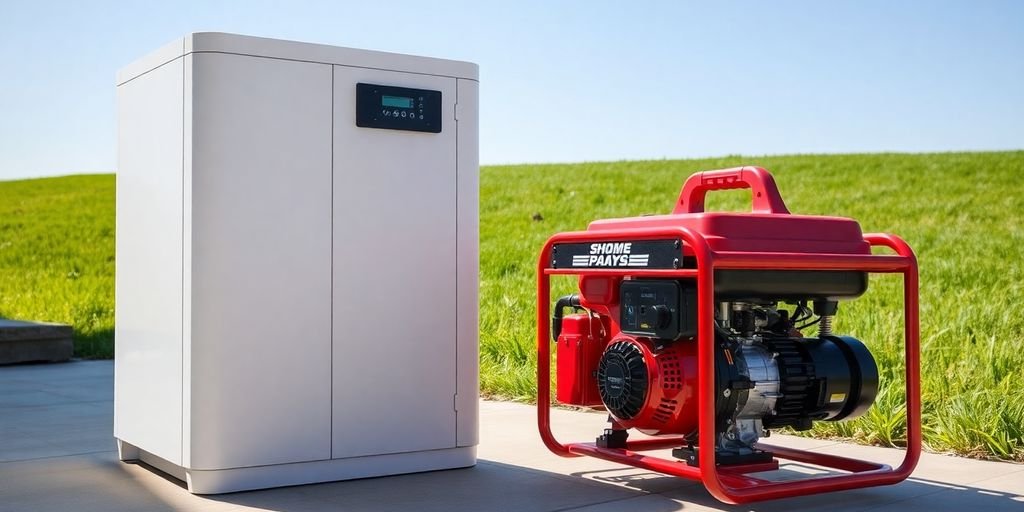
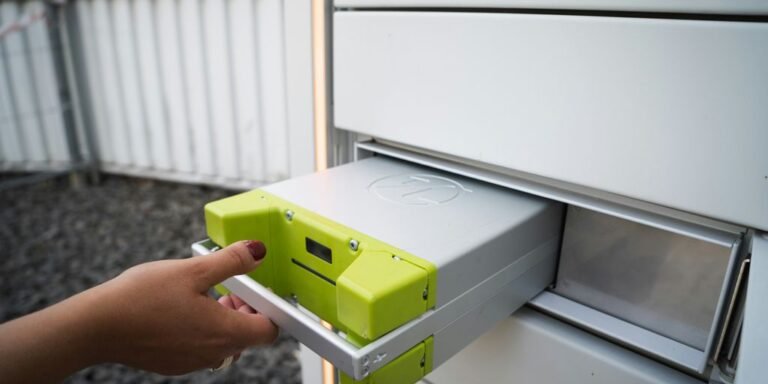

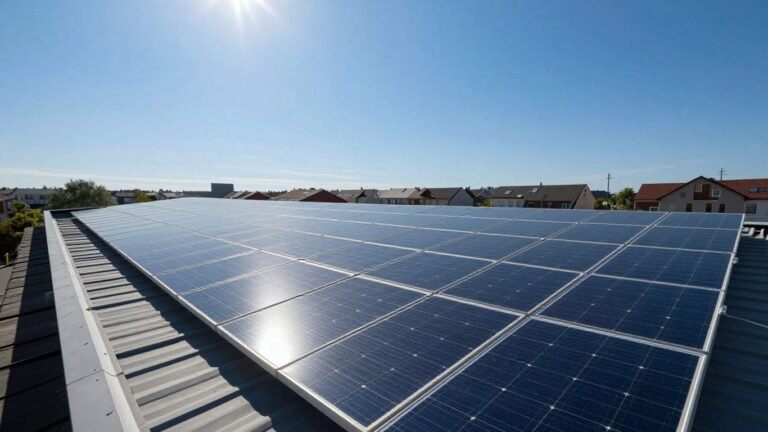
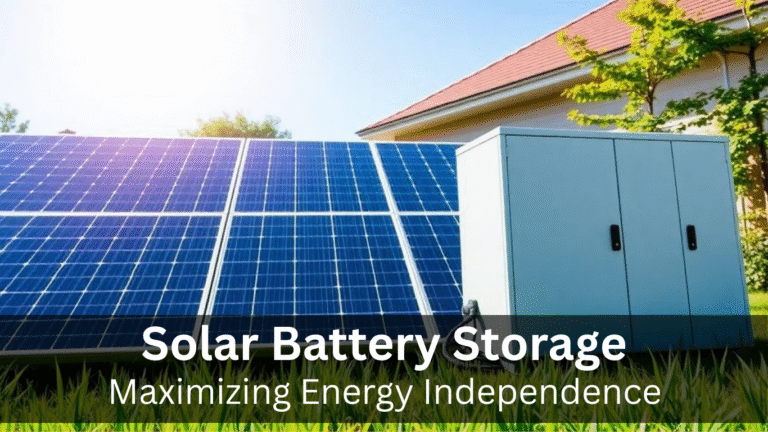

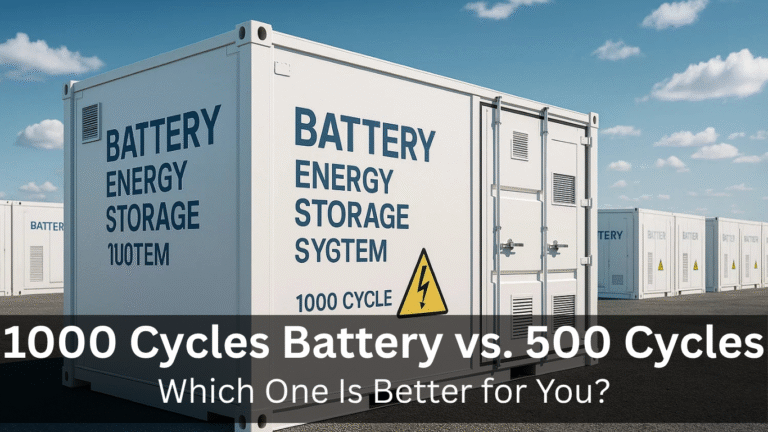

2 Comments